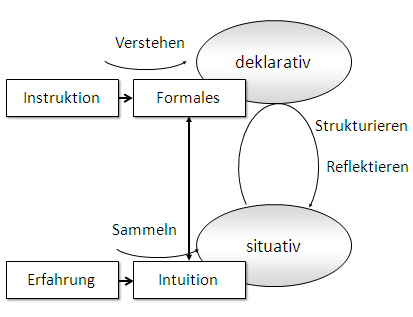Quelle: Fischbein, E. (1989). Intuition in science and mathematics: an educational approach. Dordrecht: D. Reidel Publishing Company
Fischbein ist der festen Überzeugung, dass das Arbeiten als Mathematiker ohne „Intuition“ nicht möglich ist: „The mechanisms of reasoning are, to a great extent, beyond direct, conscious control. One may, relatively, control the sources of knowledge, the meaning, the pertinence of various concluding steps of a reasoning activity, but the heuristic activity itself is mostly beyond any systematic conscious control.“ (S. 20)
Seine Hauptargument dafür ist, dass das produktive und kreative Operieren mit abstrakten Objekten nur möglich ist, wenn diese Objekte wie materielle Objekte manipuliert werden können: „The mental ‘objects’ (concepts, operations, statements) must get a kind of intrinsic consistency and direct evidence similar to those of real, external, material objects and events, if the reasoning process is to be a genuinely productive activity.“ (S. 21) Dies deshalb, da „…since a thinking activity consists in a succession of decisions and since we have to believe in our decisions, our memory and our reasoning strategies tend to select and maintain statements which appear to be intrinsically credible …“ (S. 35)
Fischbein beschreibt differenziert, welche Eigenschaften bei intuitiven Denkvorgängen zu beobachten sind. Im Wesentlichen geht es dabei um die Verwendung von Analogien, von Metaphern. „But our theory is that one has here more than a simple metaphor. Intuition fulfills, at the intellectual level, the function fulfilled by perception at the sensorial level: intuition is the direct, cognitive prelude to action (mental or practical). It organizes information in a behaviorally meaningful and intrinsically credible structure.“ (S. 56) Intuitionen entstehen aus Erfahrungen: „Intuitions are always the product of personal experience, of the personal involvement of the individual in a certain practical or theoretical activity.“ (S. 213)
Der Intuition stellt er das „Formale“ gegenüber. Formales Wissen allein ist aber nicht brauchbar. Einmal sind formale Begriffe nicht aus sich selbst heraus verständlich: „A definition or a formal description is never sufficient for really understanding the meaning of a certain term. One must always ask for examples.“ (S. 143) Und zum zweiten ist es nicht „intrinsically credible“ (S. 35), sondern seine Glaubwürdigkeit bedarf extrinsischen Quellen, wie beispielsweise einer Instruktion. Die Bedeutung des Formalen liegt in seiner Kontrollfunktion gegenüber der Intuition. Mit Hilfe formaler Mittel lassen sich Intuitionen überprüfen: „… the formal thinking contains its own mechanisms … But these mechanisms by themselves are no more than a check list, …“ (S. 23)
Im Denken ist das Zusammenspiel von Intuition und Formalem wichtig: „…understand the dual significance of meaning: On the one hand the definition explicitly stated (which are the properties defining a class of objects?). On the other hand the exemplar (or the exemplars) able to confer structurality and intrinsic coherence to the concept.“ (S. 152)
An verschiedenen Punkten lassen sich die Vorstellungen von Fischbein problemlos mit dem IML zur Deckung bringen. Die Intuitionen haben ihre Parallelen im situativen Wissen (Produkt von Erfahrungen, Handlungsleitend als Analogien). Das Formale entspricht dem deklarativen Wissen. Seine Funktion als Checkliste entspricht der reflexionsleitenden Funktion des deklarativen Wissens. Die duale Verankerung der Begriffe in der Intuition und im Formalen entspricht im IML dem Wechselspiel zwischen dem Strukturieren des situativen Wissens durch deklarative Konzepte und dem Situieren deklarativer Konzepte anhand konkreter Erfahrungen.

Weit über den aktuellen Stand des IML hinaus geht die Detailliertheit, mit der Fischbein verschiedenste Aspekte und Formen der Intuition beschreibt. Vieles daraus dürfte gerade für eine Konkretisierung des IML für den Bereich Mathematik von Interesse sein. Spannend sind unteranderem die Stellen, an denen Fischbein sich skeptisch gegenüber der Entwicklung adäquater Intuitionen äussert.
Einmal sieht er mögliche Probleme beim „Situieren“ von Konzepten: „If a notion lacks intrinsic credibility … we tend automatically to resort to means which would instill … a certain degree of intrinsic credibility. … It is very possible that the original idea (concept, statement, representation, etc.) will be distorted as an effect of that process without the subject being aware of the distortion.“ (S. 35) Zum Zweiten geht er davon aus, dass es (zumindest im Bereich Mathematik/Physik) Konzepte gibt, für die sich keine wirklich zutreffenden Intuitionen entwickeln lassen. Die mit diesen Konzepten unweigerlich verbundenen Intuitionen müssen daher ständig mit dem entsprechenden deklarativen „Warnsignal“ verbunden bleiben und ihr Gebrauch muss immer „in action“ reflektiert werden.
